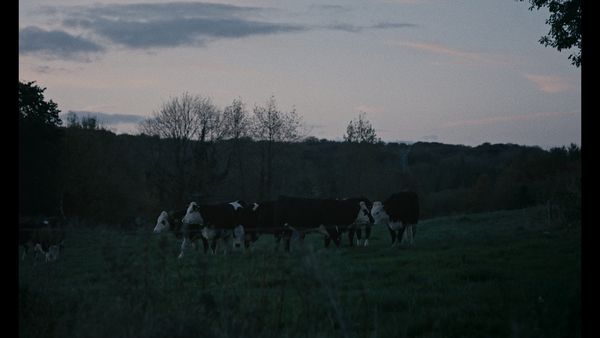 |
| Calf |
The moody, atmospheric story of a farming accident and a daughter’s decision when she finds her father in trouble, Jamie O’Rourke’s Calf has garnered attention way beyond his expectations. Starring Isabelle Connolly as the daughter, Cáit, and Kate Nic Chonaonaigh as her mother, Aine, it hinges on issues around rural life and domestic abuse, but it’s the way it handles characters and storytelling that really makes an impact. When Jamie and I met for a chat about it, I began by congratulating him of having just won the Best Short Film Grand Prize at Hollyshorts in London. He looks like he’s still glowing from the experience.
“It was a bit of a whirlwind weekend!” he explains. “Contrary to common opinion, you don't find out ahead of time. It was great. It was just a really fun event from the get go. I flew in on Friday and there was a bit of a opening ceremony and the Irish Goodbye lads were getting an award and a few other people.”
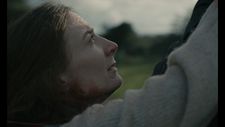 |
| Kate Nic Chonaonaigh as Aine in Calf |
The film is now Oscar-qualified, and the shortlist will be announced on Tuesday, but he says he’s not nervous. He never thought he’d be in this position and he’s aware of how much competition there is to reach the next stage.
“I think there’s 200 odd films. One of the films I saw had Cate Blanchett and Sienna Miller as its reps for the last six months, campaigning and stuff. So it's just a different kind of buzz. It's been great fun the last few weeks. We were very lucky that Sharon Horgan came on as our executive producer and it's been fun the last two weeks doing a bit of promotion around that.”
I tell him that I don’t want to make him nervous, but I've seen a fair few of those 200, and Calf is one of my two favourites. He asks what the other one is, and I tell him that it’s Kelly Pike's Picture Day. I’m drawn to both of them for similar reasons. They’re really well made and have a lot of depth, whereas, as every year, a lot of the others are primarily issue films in which those factors are secondary.
“You know, I think obviously every film is an issue film in some regards,” he says, after thanking me. “It's usually some sort of some personal struggle. But from my perspective writing it and from you watching it, I'm always trying to kind of remove that element because ultimately we want to see great stories about people and characters nonetheless, and everybody has issues in their life and they go through different things. But really what I'm interested in is very interesting people and what happens to people. I think that's where I try and get back to, is ‘Who is this person and what are they going through and how does it resolve?’ and that kind of thing.”
We discuss how this film developed.
“In 2018, I was an editor on a documentary about eight or nine women who had fled to domestic abuse shelters at one point in their lives. This was at a time in Ireland where the Domestic Violence Act of 2018 was being legislated. Legislated. Prior to that being introduced, the criminalisation of domestic abuse all centered around the physical. Coercion, emotional or mental abuse wasn't a criminal act, so couldn’t be prosecuted. So that act changed that.
“In the process of doing that documentary I became aware of these Europe-wide statistics that have been done, a huge study. One statistic in particular that stays with me is that in Ireland, one in four women at one point in their life will experience some form of domestic abuse from their current or former partner. And I know more than four women and I think everybody knows more than four women. So everybody knows somebody.
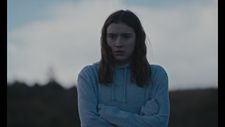 |
| Isabelle Connolly as Cáit in Calf |
“This particular story is a fictional story because I didn't think it was fair to bring to life a very particular story of somebody who'd gone through this. So that was always in mind. And yeah, I think that's where the film ultimately came from. I would never go into the details of those women, although the documentary is available. It just had such a profound impact on me and sat with me.
“The two main roles in Calf, the mother and the daughter, they represent to me – on quite a reductive level – two types of Ireland, the old Ireland and the new Ireland. And in the old Ireland under the Catholic Church, repression and everything like that was kept behind closed doors. Whereas in modern Ireland, much like many other countries, we are far more open with certain things now and we talk about them. But it still hasn't affected the statistics all that much. The statistics for domestic violence are still incredibly high.
“For me, it's the meeting of all those things, and something in particular. One of the women who were recounting their experience said, after a particularly harrowing experience that she had recounted, ‘I just wish he had died or something.’ It was a throwaway comment, but it always sat with me and it became this potential way of engaging with the theme.”
I tell him that I'm interested in the way he ties that into the rural setting, because I think people in cities don't always grasp what it's like there, that people are living often very isolated lives. And also the sense that everybody has very fixed responsibilities and roles.
“Absolutely,” he says. “You’ve hit the nail on the head. I mean, the remoteness in itself, it is an expansive rural location that seems to go on forever. But in that sense, it creates this pressure cooker as there’s nowhere to go. Even though there's everywhere to go, there's nowhere to go because it's totally remote or cut off.
“This idea of roles that you mention, that really comes back to social constructionism, doesn't it? We build these things for ourselves. The idea of mother, the idea of daughter – we created those things, we as a species. And we kind of lock ourselves into these gender roles. I think that is explored in Calf as well, certainly from an Irish perspective, because it feels and looks like an Irish story, and it is.
“I guess that's how I think filmmakers can make more powerful films. They can find something that is very specific. But also with Calf, it has that universal theme, because that statistic I said about one in four Irish women, that's the same in the UK. Across every country, it's pretty much 25% of women. That's a huge number of women. And so regardless of it being an Irish-feeling film, it's traveled quite well in that sense because it is such a universal theme.”
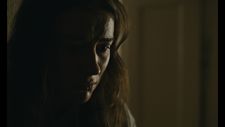 |
| Isabelle Connolly as Cáit in Calf |
Then there’s the idea of the calf as well – calves, when they're born, they have to be able to walk straight away and to be able to function in that way. They're precocial animals. And it seems that Cáit is in a similar position in that she has to take on adult responsibilities right away.
“That's a really good spot. Part of being on the circuit has been a lot of questions about ‘What does the calf mean?’ And it has multiple meanings, right? There's the element of rebirth. There’s exactly what you said there. Also, it's a counter narrative, I guess. When we first are introduced to the film, it feels like that's the abnormal thing. And then when we cut into the kitchen situation, it feels, on the face of it, a very normal family. This is the closed door thing I was talking about. But by the end of the film, those two things are reversed.
“Within genre filmmaking, quite often violence towards women and people in general is gratuitous, unmotivated, non-thinking, you know? So I wanted to subvert that trope and introduce the film almost as a genre film. It’s a horror film in a sense, but the monster is very much real. The other thing I didn't want to do is – and I get it, because we want to know what the other is – we are fascinated by serial killers, and those are the leads in these things. For me, I wanted to make a film about Cáit and Aine.
“That's why we don't see any domestic violence. There's no flashbacks, there's no Michael. The father is not a central character. He's looming over it all, and it helps that we pull him back, I think. It's just at the start that he's a shadowy figure, you know, but I think it bleeds into the rest of the film. We don't ever get to know him, but we ultimately know him by the end. But that's through Cáit and Aine, as opposed to through Mike. I'd love to see more films that do that.
“I think that the most interesting thing about filmmaking in the last five or ten years, is these channels of funding and filmmaking are opening up to more and more people from different backgrounds, and we're seeing unbelievable films come through. We have this generic storyline that we've all seen over and over again of this guy that goes through this thing and whatever, you know what I mean? We're seeing a lot more, and not just – although it's incredibly important - representation, but from a creative point of view. We're seeing far more interesting stories, which is really where we want to be. We want everything to be representative and equal because we will see far more breadth of creative stories and interesting stories.
“I think we've started to see that really bloom over the last few years. I don't know how you feel about it, but independent cinema in particular – every time I see Aftersun, I'm in floods of tears. That's such a powerful film. Or Moonlight as well, you know? We're seeing such strong news, voices and stories coming through. The thing I think about writing is everybody should be able to write whatever they want, but you're judged on two things, right? Quality and representation. I think you can only have quality if you have representation. And if you can't write a story with full representation because you don't have that experience, then you probably shouldn't be doing that story.”
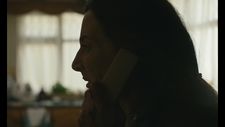 |
| Kate Nic Chonaonaigh as Aine in Calf |
This doesn’t mean that people can’t tell whatever stories they like if the go to the trouble of researching them thoroughly and finding strong ways into the characters, he stresses. We discuss the neighbours in Calf and whether or not they know what’s going on within the family.
“For me, nobody knows except the family,” he says. “This script got distilled from a 25 page unaffordable-on-a-short-film-budget script. We do see other things in terms of background, in terms of what I have in my head when I'm writing the characters. Cáit used to be a swimmer until she had to stop because these things are evident on her body. These things are kept from other people and hidden and kept by the family.
“I still am writing something else about this because I find this incredibly interesting – the idea that Aine, the mother in Calf could retain guilt around keeping kids in this situation because that's such a complex guilt. It's such a complex idea of guilt. It's such a complex idea in general. I think that woman should have no guilt, but, you know, but the fact is she will. But where does it stop? Let's say she had run when Cáit was three – Cáit and Aine wouldn't have a brother or son. These are the things that we should be factoring in when we think it's not so binary, it's so complex and grey.
“I think there's great hope in the last scene, but you know, the scars of these things are literal and figurative. They don't just heal; they're there forever. It's something that they all have to carry, and it’s hell. It's something that is formative in Cáit's character and personality and who she is as a person forevermore. You can't just take that away.”
We talk about the pacing of the film.
“I think stylistic and structural stuff is a matter of perspective and a personal taste, but I agree wholeheartedly. I don't like quick-cutty stuff. One of my favourite filmmakers is Andrea Arnold, and I think if you've ever seen American Honey, when Star is being driven out to the oil fields, I think that's one of the most tense scenes I've ever seen, where it just grips you and it holds you for the whole duration of that scene, and you have no clue what's going to happen. It’s profound and engaging – there's just so many layers to that scene, and barely anything is said.
“That uses the geography of the place. It uses everything to build this tension. For me, when I started to think about how we would frame Cáit and how we would structure it, I was thinking about Andrea Arnold all the time. Because what she does is she creates very tense moments with muddy characters. Like, if you've seen Bird, when she [Nykiya Adams’ character] goes back to the family home and the boyfriend is in there, the minute we see him, we know he's what he is. We see those little kids in that house, and we just feel this knot in our stomachs thinking of what's going to happen.
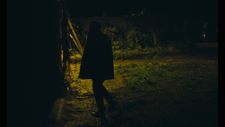 |
| "A shadowy figure" - Stephen Hogan as Michael in Calf |
“I think Andrea Arnold is one of the best at doing that. I really do. She doesn't create tension with plot, she creates tension with character, and that's far more powerful. Because, you know, it really does feel authentic. It's about these people and they're well drawn, authentic people, and we feel that jeopardy they’re in. I guess that's what I was thinking about with the structure and how we were going to let stuff breathe and try and retain the tension throughout.”
So what are his hopes for the future?
“I've got a couple more short films coming out and I'm so thankful. We're very lucky in Ireland that every year 25 to 30 new funded short films get made, so that's 25 to 30 new storytellers coming in. They've been given a chance to fail if need be, without any market pressures or commercial pressure. And I think that's really, really important in finding your craft and your voice and all those clichés. If you're not expected to deliver in a commercial sense, you get the freedom to find the way you want to tell stories. So I've made four short films and I'm currently writing two or three features and I'm hoping one of those will be my first feature film.
“So that's the goal. It takes a lot longer than I thought originally when I started. Hopefully we get there. It's been really nice. The stepping stones have been there. People are incredibly supportive. I've met such wonderful people. And I think, you know, making short films really, really tells you what your role and function is as a director. You're giving information to people, you're not telling them what to do. When I first started out it was all outcome based directions. If you tell somebody how to act or whatever, it just doesn't work. So the shorts have been brilliant. I think I'm ready to move on to a feature. Hopefully we’ll find out.”





















